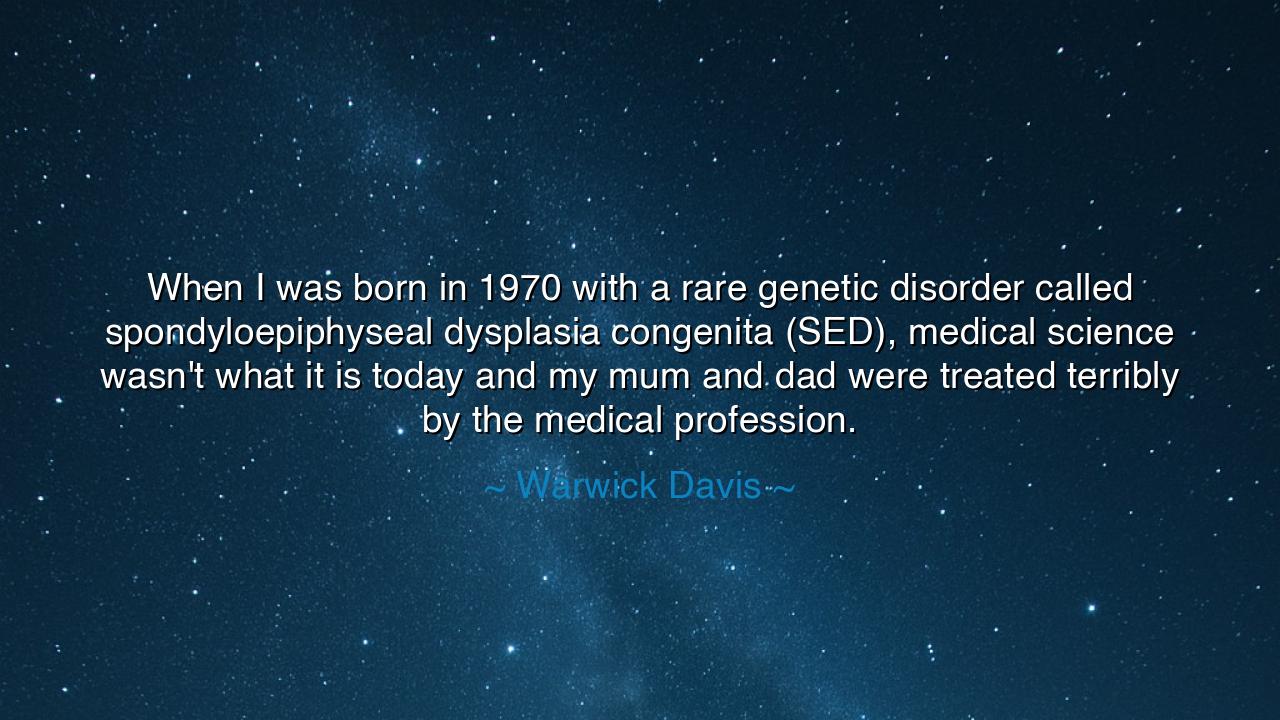
When I was born in 1970 with a rare genetic disorder called
When I was born in 1970 with a rare genetic disorder called spondyloepiphyseal dysplasia congenita (SED), medical science wasn't what it is today and my mum and dad were treated terribly by the medical profession.






"When I was born in 1970 with a rare genetic disorder called spondyloepiphyseal dysplasia congenita (SED), medical science wasn't what it is today and my mum and dad were treated terribly by the medical profession." — Warwick Davis
Hear, O listeners, the heartfelt truth of Warwick Davis, whose life began not in ease, but in trial. In his words, there lies both pain and triumph — a story that bridges the imperfection of medical science with the enduring strength of the human spirit. When he says, “my mum and dad were treated terribly by the medical profession,” he speaks not in bitterness, but in remembrance — a remembrance of a time when knowledge was narrow, and compassion often failed to match it. His words echo across generations as both a lament and a lesson: that the measure of civilization is not only in its cures, but in its kindness toward the afflicted.
In the year 1970, when Davis was born, the understanding of rare genetic disorders was limited. The disorder he names — spondyloepiphyseal dysplasia congenita (SED) — is a condition that affects bone growth, leading to dwarfism and skeletal complications. But in that time, the world did not yet possess the tools of empathy or inclusion that it slowly learns today. The medical profession, though noble in purpose, often erred in heart; its practitioners could be cold, its judgments harsh. His parents, already burdened with fear for their newborn child, faced a second wound — the cruelty of indifference from those who should have offered comfort.
Yet, within this sorrow, there glows the eternal light of resilience. For from that same child, born into misunderstanding, arose a man who would bring joy, inspiration, and hope to millions. Warwick Davis, who once lay in a cradle beneath the shadow of prejudice, would grow to stand among heroes and legends, portraying roles that stirred the imagination of generations. His life became a testament to this truth: that the human spirit, when nurtured by love and courage, can rise above the ignorance of its time. His story mirrors that of many whose bodies bear the mark of difference, yet whose souls radiate greatness.
In this, his quote becomes not a complaint, but a mirror of history. It reminds us that progress is not only a matter of science, but of compassion. The physicians of old sought to conquer disease, but too often failed to embrace the dignity of those who bore it. The ancient healers — in the temples of Egypt or the clinics of Greece — believed that to heal the body, one must first honor the person. For what is medicine without mercy? What is knowledge without humility? Davis’s words summon us back to that eternal truth: that healing begins not with instruments or diagnoses, but with the heart’s recognition of shared humanity.
There are stories, too, from the pages of history that echo this truth. The tale of Joseph Merrick, known as “The Elephant Man,” is one such. Born in the nineteenth century with severe deformities, he was cast out, mocked, and misunderstood — until one doctor, Frederick Treves, chose not to see a specimen, but a man. Through compassion, Treves transformed Merrick’s final years into ones of dignity and peace. So too do Warwick Davis’s words urge the same awakening: that every soul deserves respect, regardless of the form in which it was born. The failure of his parents’ doctors was not in their science, but in their lack of empathy — and this, above all, is what humanity must forever strive to mend.
Davis’s reflection also carries a call for gratitude — for the progress of medicine, and for those who labor now to prevent the mistakes of the past. Today, with the rise of genetic research, patient advocacy, and inclusive care, the child born with SED or any rare condition need not endure the same coldness his parents faced. Yet even as we advance in knowledge, his words warn us: let not pride in technology make us forget the ancient art of kindness. For the most advanced machine cannot offer comfort, and no scientific formula can replace a gentle word spoken in love.
So, O children of the present and guardians of the future, take heed of Warwick Davis’s wisdom. Progress without compassion is blindness. Let every physician, nurse, and healer remember that the patient before them is not a case, but a story — a life sacred and unrepeatable. Let every parent who faces hardship find strength in love rather than despair. And let every soul remember: those who suffer in body are not less than others — they are teachers, showing the world what it truly means to endure.
In the end, Davis’s story is not one of tragedy, but of triumph born from tenderness. Out of misunderstanding came awareness; out of pain, purpose. His words call us to live with empathy, to treat others with dignity, and to ensure that no parent, no child, no patient shall ever again be met with cruelty where care should be. For though medicine may heal the body, it is compassion — eternal, unmeasurable, divine — that heals the world.






AAdministratorAdministrator
Welcome, honored guests. Please leave a comment, we will respond soon